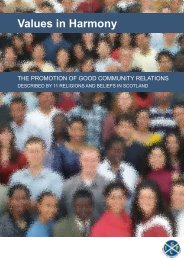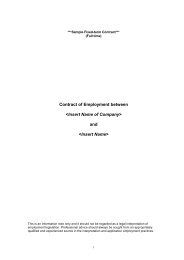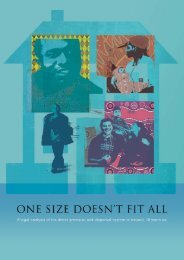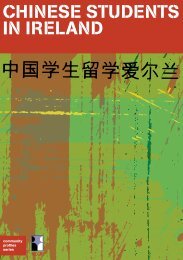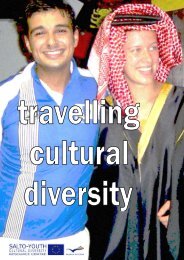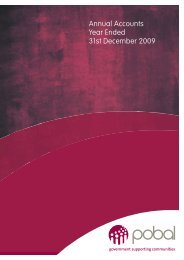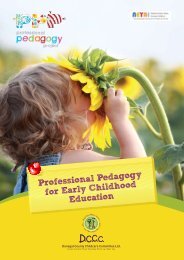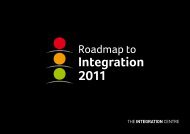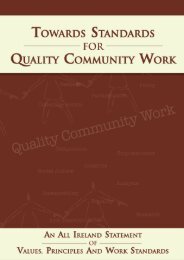Intercultural Education in the Post-Primary School - National Council ...
Intercultural Education in the Post-Primary School - National Council ...
Intercultural Education in the Post-Primary School - National Council ...
Create successful ePaper yourself
Turn your PDF publications into a flip-book with our unique Google optimized e-Paper software.
• Students explore social issues throughmovement, where students respond to<strong>the</strong>mes/stimuli thus express<strong>in</strong>gemotions/feel<strong>in</strong>gs.• Students develop an awareness of safepractice with<strong>in</strong> all activities and adoptbehaviours, which ensure mutual respectfor <strong>the</strong> safety of peers and self.• Students should demonstrate respect foro<strong>the</strong>rs’ viewpo<strong>in</strong>t, listen to each o<strong>the</strong>rand tak<strong>in</strong>g turns. In this environmentstudents feel confident to give <strong>the</strong>irop<strong>in</strong>ion with<strong>in</strong> group/whole classactivities.A detailed audit of <strong>the</strong> opportunities for<strong>in</strong>clud<strong>in</strong>g <strong>in</strong>tercultural <strong>the</strong>mes <strong>in</strong> P.E. aswell as sample lessons can be found on <strong>the</strong>CD-ROM and at www.ncca.ie.Religious <strong>Education</strong>Religious education should ensure thatstudents are exposed to a broad range ofreligious traditions and to <strong>the</strong> non-religious<strong>in</strong>terpretation of life. It has a particularpart to play <strong>in</strong> <strong>the</strong> curriculum <strong>in</strong> <strong>the</strong>promotion of tolerance and mutualunderstand<strong>in</strong>g. It seeks to develop <strong>in</strong>students <strong>the</strong> skills to engage <strong>in</strong> mean<strong>in</strong>gfuldialogue with those of o<strong>the</strong>r, or of no,religious traditions.(Syllabus, p 4)The syllabus for Religious <strong>Education</strong>, atboth junior and senior cycle, places greatemphasis on <strong>the</strong> value of religious diversityand on mutual respect for people of allbeliefs. One of <strong>the</strong> primary aims ofReligious <strong>Education</strong> is ‘to provide studentswith a framework for encounter<strong>in</strong>g andengag<strong>in</strong>g with a variety of religioustraditions <strong>in</strong> Ireland and elsewhere’.Both its content and its aims arecompatible with <strong>the</strong> content and values of<strong>in</strong>tercultural education. Religious<strong>Education</strong> aims to foster an awareness of<strong>the</strong> human search for mean<strong>in</strong>g that iscommon to all peoples and encouragesstudents to recognize different responses tothat search <strong>in</strong> different cultures andcontexts. It also explores how religioustraditions have contributed to <strong>the</strong> culturewe live <strong>in</strong> and cont<strong>in</strong>ue to have an impacton human behaviour and lifestyle. It seeksto develop <strong>in</strong> students <strong>the</strong> skills to engage<strong>in</strong> mean<strong>in</strong>gful dialogue with those of o<strong>the</strong>r,or of no, religious traditions. As such, itcan play an important role <strong>in</strong> <strong>the</strong>curriculum <strong>in</strong> <strong>the</strong> promotion of respect andmutual understand<strong>in</strong>g.A detailed audit of <strong>the</strong> opportunities for<strong>in</strong>clud<strong>in</strong>g <strong>in</strong>tercultural <strong>the</strong>mes <strong>in</strong> R.E. aswell as sample lessons can be found on <strong>the</strong>CD-ROM and at www.ncca.ie.ScienceJunior Certificate Science provides studentswith a means of understand<strong>in</strong>g <strong>the</strong> naturaland physical world and <strong>the</strong> relevance andapplication of science to <strong>the</strong>ir personal andsocial lives. It provides knowledge about<strong>the</strong> world and opportunities for scientific<strong>in</strong>vestigation. The learn<strong>in</strong>g experiencesenable students to develop positiveattitudes towards <strong>the</strong>mselves, o<strong>the</strong>rs, <strong>the</strong>environment and science and technology.An <strong>in</strong>tercultural perspective enablesappreciation of <strong>in</strong>dividual and culturaldifferences. It considers multiple voices andmultiple perspectives rang<strong>in</strong>g from <strong>the</strong>voice of each student <strong>in</strong> <strong>the</strong> classroom to<strong>the</strong> contributions from <strong>the</strong> many culturesof <strong>the</strong> world to different aspects of science.Science education, like <strong>in</strong>terculturaleducation, is concerned with foster<strong>in</strong>gskills of <strong>in</strong>dependent enquiry and creativeaction. The analytical th<strong>in</strong>k<strong>in</strong>g skills,which are learned through scientific<strong>in</strong>quiry, are transferable to <strong>the</strong> analysis of<strong>the</strong> social world, and contribute directly to<strong>in</strong>tercultural competence. So too ‘an abilityto form op<strong>in</strong>ions and judgements based onevidence and experiment’ (aim listed <strong>in</strong>J.C. Science Syllabus, p.3) is vital <strong>in</strong>74<strong>Intercultural</strong> <strong>Education</strong> <strong>in</strong> <strong>the</strong> <strong>Post</strong>-<strong>Primary</strong> <strong>School</strong>




